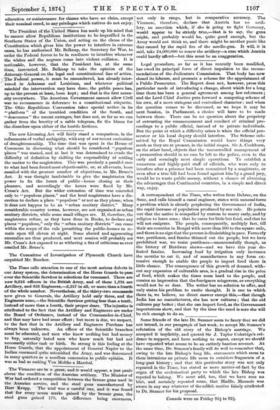Legal procedure, so far as it has recently been modified,
has owed its principal force of direct impulsion to the recom- mendations of the Judicature Commission. That body has now closed its labours, and presents a scheme for the appointment of a Public Prosecutor. The Report does not, however, press this particular mode of introducing a change, about which for a long time there has been a general agreement among law reformers ; and the Lord Chief Justice puts forward a competing scheme of his own, of a more stringent and centralised character; and when the question comes to be discussed, as we hope it may be next Session, in Parliament, a choice will have to be made between these. There can be no question about the propriety of entrusting the commencement and conduct of criminal pro- ceedings to a public official, instead of to private individuals. But the point at which a difficulty arises is when the official pro- secutor or his local deputy should interfere. The Scheme sub- mitted by the Royal Commission would leave things very much as they are at present, in the initial stages. Sir A. Cockburn, on the other hand, objects that the uncontrolled management of a prosecution should in no case be left to the police, even in the early and seemingly most simple operations. To establish a numerous and highly-paid staff of officials, who were only to interfere after a prisoner had been committed by a magistrate, or even after a true bill had been found against him by a grand jury, would be to waste public money, without a chance of obtaining the advantages that Continental countries, in a simple and direct way, enjoy.






























 Previous page
Previous page